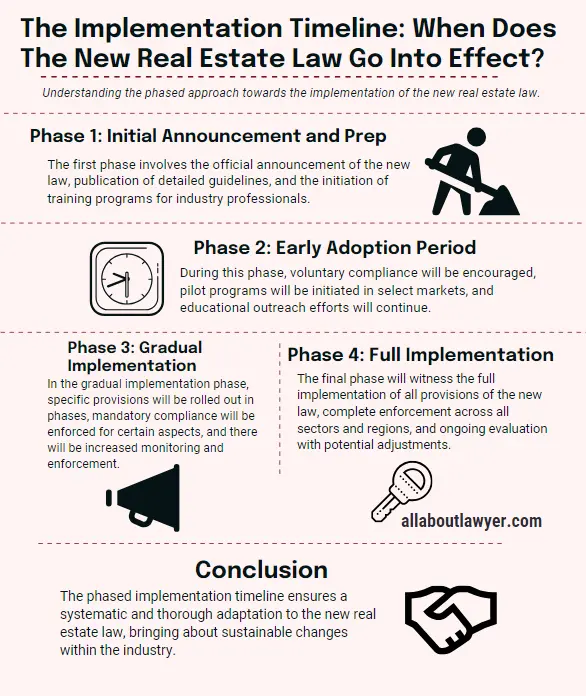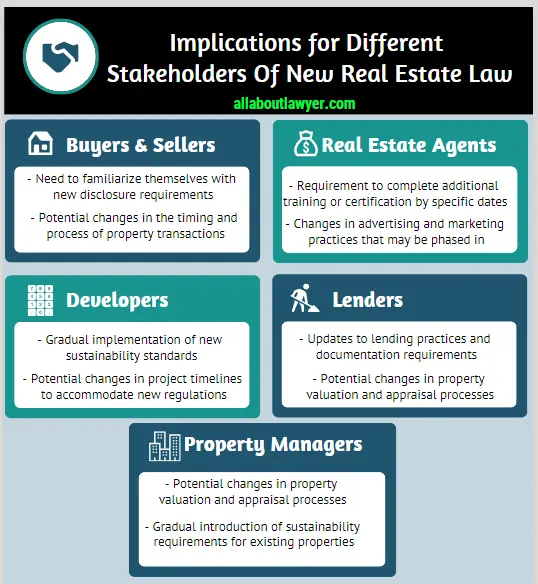When Does the New Real Estate Law Go Into Effect?
The real estate industry is on the brink of significant change as new property legislation prepares to take effect. This comprehensive article will delve into when does the new real estate law go into effect and its implementation timeline of these fresh property law provisions, exploring their potential impact on various stakeholders in the housing market. From homebuyers and sellers to real estate professionals and investors, understanding when and how these changes will be rolled out is crucial for navigating the evolving landscape of property transactions.
Table of Contents
The Context Behind the New Real Estate Legislation
Before we dive into the specifics of when the new real estate law goes into effect, it’s essential to understand the context that has led to these changes. The property market has faced numerous challenges in recent years, including:
1. Affordability concerns in major urban centers
2. Increased demand for transparency in real estate transactions
3. The need for more sustainable development practices
4. The impact of technology on property buying, selling, and management
5. Concerns about fair housing and discrimination in the real estate industry
These factors have collectively contributed to the development of new property guidelines aimed at addressing these issues and modernizing the real estate sector.
Key Components of the New Real Estate Law
To fully appreciate the significance of the implementation timeline, let’s briefly overview some of the key components of the new legislation:
1. Enhanced transparency requirements for property transactions
2. Stricter regulations on real estate advertising and marketing
3. New sustainability standards for property development and management
4. Updated fair housing provisions to combat discrimination
5. Integration of digital technologies in property transactions and record-keeping
6. Revised licensing requirements for real estate professionals
7. New guidelines for property valuations and appraisals
Each of these components may have different implementation dates, adding complexity to the overall rollout of the new law.
Read also: What Is The New Real Estate Commission Law In The US?
The Implementation Timeline: When Does The New Real Estate Law Go Into Effect?
The property legislation implementation is not a single event but rather a phased process that will unfold over time. Here’s a breakdown of when does the new real estate law go into effect key dates and phases:
Phase 1: Initial Announcement and Preparation
– Date: August 17, 2024
– Activities:
– Official announcement of the new law
– Publication of detailed guidelines and resources
– Initial training and education programs for industry professionals
Phase 2: Early Adoption Period
– Typically 3-6 months after announcement
– Activities:
– Voluntary compliance encouraged
– Pilot programs in select markets or regions
– Continued education and outreach efforts

Phase 3: Gradual Implementation
– Typically 6-12 months after announcement
– Activities:
– Phased rollout of specific provisions
– Mandatory compliance for certain aspects of the law
– Increased enforcement and monitoring
Phase 4: Full Implementation
-Typically 12-18 months after announcement
– Activities:
– All provisions of the new law in full effect
– Complete enforcement across all regions and sectors
– Ongoing evaluation and potential adjustments
It’s important to note that these dates may vary depending on your specific location and the particular aspects of the law. Always consult with local real estate authorities or legal professionals for the most up-to-date information relevant to your area.
Factors Influencing the Implementation Timeline
Several factors can impact the real estate regulation enforcement schedule:
1. Complexity of the Law:
More complex provisions may require a longer implementation period to allow for proper understanding and adaptation.
2. Industry Readiness:
The level of preparedness within the real estate sector can affect how quickly new regulations can be effectively implemented.
3. Technology Infrastructure:
Some aspects of the law may depend on the development or integration of new technologies, which can influence timing.
4. Regional Variations:
Different states or regions may have varying timelines for adopting and enforcing the new regulations.
5. Economic Conditions:
The overall state of the economy and the real estate market may impact the pace of implementation.
6. Feedback and Adjustments:
Initial feedback during early phases may lead to adjustments in the timeline or specific provisions.
Implications for Different Stakeholders
Understanding when the new real estate law goes into effect is crucial for various stakeholders in the property market. Let’s explore the implications for different groups:
For Homebuyers and Sellers:
– Need to familiarize themselves with new disclosure requirements
– Potential changes in the timing and process of property transactions
– New protections and rights that may come into effect at different times
For Real Estate Agents and Brokers:
– Requirement to complete additional training or certification by specific dates
– Changes in advertising and marketing practices that may be phased in
– New responsibilities in ensuring compliance with phased regulations

For Property Developers:
– Gradual implementation of new sustainability standards
– Potential changes in project timelines to accommodate new regulations
– Phased introduction of new requirements for affordable housing components
For Lenders and Financial Institutions:
– Updates to lending practices and documentation requirements
– Potential changes in property valuation and appraisal processes
– New compliance measures that may be introduced over time
For Property Managers:
– Phased implementation of new tenant protection measures
– Gradual introduction of sustainability requirements for existing properties
– Changes in record-keeping and reporting practices
Preparing for the New Real Estate Law: Steps to Take Now
While the full implementation of the new real estate law may be months away, there are steps that industry participants can take now to prepare:
1. Stay Informed:
Regularly check official sources for updates on implementation dates and specific requirements.
2. Attend Training Sessions:
Participate in educational programs offered by industry associations or regulatory bodies.
3. Review Current Practices:
Assess your current operations against the new requirements to identify areas that may need change.
4. Consult with Experts:
Seek advice from legal professionals or compliance experts specializing in real estate law.
5. Implement Gradual Changes:
Begin adapting your practices in phases to align with the implementation timeline.
6. Communicate with Clients:
Keep your clients or customers informed about upcoming changes and how they may be affected.
7. Invest in Technology:
Consider upgrading your technology infrastructure to meet new digital requirements.
Challenges and Concerns Surrounding the Implementation
The rollout of new property guidelines is not without its challenges and concerns:
1. Compliance Costs:
Concerns about the financial burden of implementing new requirements, especially for smaller businesses.
2. Confusion and Misinterpretation:
Risk of misunderstanding or misinterpreting new regulations during the phased implementation.
3. Market Disruption:
Potential for temporary disruptions in the real estate market as stakeholders adjust to new rules.
4. Enforcement Consistency:
Concerns about how consistently the new regulations will be enforced across different regions.
5. Technological Readiness:
Questions about whether all necessary technological infrastructure will be in place by the implementation dates.
6. Unintended Consequences:
Potential for unforeseen impacts on the market or certain stakeholders as new rules take effect.
The Future of Real Estate Under the New Law
As the implementation of the new real estate law unfolds, we can expect to see significant changes in the property market:
1. Increased transparency and consumer protection in property transactions
2. A shift towards more sustainable and energy-efficient properties
3. Greater integration of technology in real estate processes
4. Enhanced professionalism and accountability in the real estate industry
5. Potential for more stable and equitable housing markets
The phased implementation of these changes will allow for a gradual adaptation, but it’s clear that the real estate landscape will look quite different once the new law is fully in effect.
Conclusion
The implementation of new real estate legislation represents a significant shift in the property market. While the exact dates may vary depending on your location and the specific aspects of the law, it’s clear that changes are coming, and they will be phased in over time.
By staying informed about the implementation timeline, understanding the key components of the new law, and taking proactive steps to prepare, stakeholders in the real estate industry can navigate this transition successfully. Whether you’re a homebuyer, seller, real estate professional, or investor, being aware of when and how these changes will take effect is crucial for making informed decisions in the evolving real estate landscape.
Remember, the implementation of new laws is a dynamic process, and timelines may be subject to change. Always consult with local real estate authorities or legal professionals for the most current and relevant information for your specific situation.
Related Articles For You:
What Does the New Real Estate Law Mean?
FAQs
Q: Will all aspects of the new real estate law go into effect at the same time?
A: No, the implementation is typically phased, with different aspects of the law coming into effect at various times. This allows for a smoother transition and gives stakeholders time to adapt to changes.
Q: How can I stay updated on the specific implementation dates for my area?
A: Check with your local real estate regulatory body, attend industry seminars, and follow official government communications for the most up-to-date information on implementation dates in your area.
What happens if I’m in the middle of a real estate transaction when new regulations take effect?
Generally, transactions already in progress when new regulations take effect may be governed by the old rules. However, this can vary, so it’s best to consult with a real estate attorney for guidance on your specific situation.
Are there penalties for non-compliance with the new law once it goes into effect?
Yes, there are typically penalties for non-compliance, which may include fines, license suspension, or other disciplinary actions. The severity often depends on the nature and extent of the violation.
Will there be a grace period for adjusting to the new regulations after they go into effect?
Some aspects of the law may include a grace period for compliance, but this varies. It’s best to prepare for full compliance by the official implementation date rather than relying on potential grace periods.
About the Author

Sarah Klein, JD, is an experienced estate planning attorney who has helped clients with wills, trusts, powers of attorney, and probate matters. At All About Lawyer, she simplifies complex estate laws so families can protect their assets, plan ahead, and avoid legal headaches during life’s most sensitive moments.
Read more about Sarah
